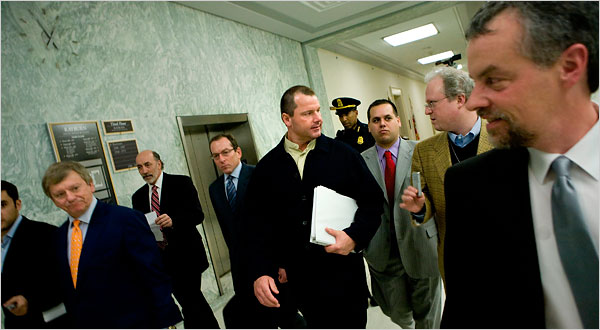Twice this month Roger Clemens has provided testimony under oath regarding the statements made by his former trainer Brian McNamee to the people who created the Mitchell Report. Each time he has done so, every legal expert from CNN to ESPN has made the point that he was testifying at the risk of being charged with perjury if it can be proven that he has lied. In fact, some have used this fact as an indicator that he must be telling the truth.
This displays a fundamental misunderstanding of the Federal perjury statutes, found at Title 18 of the U.S. Code, Sections
1001,
1621 and
1623. All three sections basically punish lying (among other means of deception) under oath about a "material" fact before federal authorities punishable by up top five years in prison.
spacer
In addition, the United States Supreme Court has added some other guidelines. First, a perjury conviction (like treason) requires at least two witnesses establishing the falsity of the defendant's statement. Second, a literally true answer cannot be perjurious, no matter how misleading. Third, an answer to an ambiguous question cannot be perjurious, no matter how obvious the intended meaning of the question is.
We know that false sworn testimony and depositions before a House Committee (Oversight and Government Reform in this case) can constitute perjury because the statutes clearly say so. If we assume that either Clemens or McNamee lied today, and we pretend for the sake of argument that there are two witnesses who can testify as to one of them lying, the last barrier is whether the facts lied about were "material."
What is the definition of "material" for the purposes of this statute? Why not look at the
U.S. Attorney's Manual, Section 1748 for guidance?
"A false statement is material if it has a natural tendency to influence, or is capable of influencing, the decision of the decision-making body to which it was addressed." (Citations omitted).
 Photo: New York Times
Photo: New York TimesThere's the rub. The House Oversight and Government Reform Committee held this hearing (and the earlier one) to determine the validity of the Mitchell Report and to hear criticisms of it, as drug abuse falls under their purview and steroids are considered to be drugs. Under the broadest of interpretations, the Committee sought to determine the prevalence of steroid use in baseball (much like the famous 2005 McGwire/Palmeiro/Sosa hearing). Using that level of abstraction, nothing Clemens could have said would be material to their decision. He is but one player.
Under a more narrow level of abstraction, the Committee sought to determine, vis a vis Clemens, whether the Mitchell Report was accurate. Again, nothing Clemens could say, true or false, is material to that decision. The Mitchell Report did not state that Clemens used steroids and/or HGH. It stated that Brian McNamee TOLD THEM that Clemens used steroids and/or HGH.
One could argue that the determination of whether it is McNamee, Clemens or both who are lying goes towards determining whether the Mitchell Report sufficiently investigated the allegations made and reported. Even under that view, no one denies that the MLBPA categorically told the Mitchell Report that no player would speak about the allegations, which Clemens and his attorney repeated today. According to Clemens, and again this is not disputed, no player actually was permitted to talk to Mitchell, which is providing a wonderful layer of plausible deniability to the named players now. Thus, even if Clemens lied his ass off today before Congress, it is not material to deciding whether the Mitchell Report is accurate. Even if McNamee lied his ass off today, it is not material to determining whether the Mitchell Report is accurate.

One also could argue that there was no decision to be made, and thus there could not be perjury no matter what was said in response to any question.
Any way you slice it, using the evidence presently known, it would be difficult to prove beyond a reasonable doubt that either Clemens or McNamee lied today. Adding that the government would have to prove beyond a reasonable doubt that any lies were material to the hearing raises the bar so high that I cannot imagine perjury charges being filed under any circumstances. This was not Barry Bonds lying before a grand jury, but rather two men restating their months-old positions before a Congressional body with no decision before it.
spacer
This post was written by an attorney licensed in Maryland and the District of Columbia.
 Photo: New York Times
Photo: New York Times One also could argue that there was no decision to be made, and thus there could not be perjury no matter what was said in response to any question.
One also could argue that there was no decision to be made, and thus there could not be perjury no matter what was said in response to any question.
4 Responses:
I understand that someone defending Clemens could make the argument that there was no decision to influence, or that the only decision was to decide the accuracy of the Mitchell Report (in terms of, did McNamee say X and Y? Yes, he did). But by that interpretation, there was no reason to have a hearing. No one said that Sen. Mitchell misreported what he was told.
My understanding was that the decision being made was about the accuracy of the allegations made in the Mitchell Report, thus truly a hearing about the guilt or innocence of Roger Clemens.
This would be examined by the Committee as it attempts to decide whether or not the picture painted in the Mitchell Report is real, and therefore if steroid use is as rampant as the report leads us to believe. If there are major holes poked in the report, such as the number one snitch flat-out lied about one of the players in the report, then the whole report has to be questioned, and perhaps drug use is not as severe a problem as McNamee led us to believe.
I still think perjury is in play, personally. That does not mean I think he will be charged or convicted.
By the way, what happens if/when these defamation suits get started?
The hearing was unnecessary as there was no decision to be made. If they really wanted to know about the accuracy of the allegations in the report they would have subpoenaed a whole slew of people named in the report along with Radomski. It's as if they accepted Radomski's allegations and only gave Roger some face time because he vehemently denied McNamee's statements. There's still no decision to be made based on McNamee and Clemens' testimony, whether truthful or not. I can't see how any of it is material to any decision.
Perjury is out of play because the Federal government does not bring high profile cases to lose.
The defamation suits, as far as we know, haven't even been served as of yet. I think it would be foolish for either side to serve them at this point, and if they have been served they would be better off dropping them on both sides. What Roger really can't afford right now is for a civil jury to decide there's a 50.1% chance that he's lying and award McNamee a large sum of money.
So umm...I don't understand why Congress even cares about Steroids and cheating in sports. Don't they have more important things to take care of? What are they getting out of this assuming that they are just like every other politician.
Supposedly the House Oversight and Government Reform Committee oversees federal drug policy, and steroids (but not legal HGH) are considered "drugs" under federal law. I think you'd be annoyed to see what kinds of things the House Committees hold hearings on, and how sparsely attended most of those actually are. This happened to be something of national interest (because it was a dog-and-pony show) so it got more attention.
If I were facing foreclosure, had a son in Iraq or were serving a six-year prison term for possession of crack, I'd be pretty annoyed.
Post a Comment